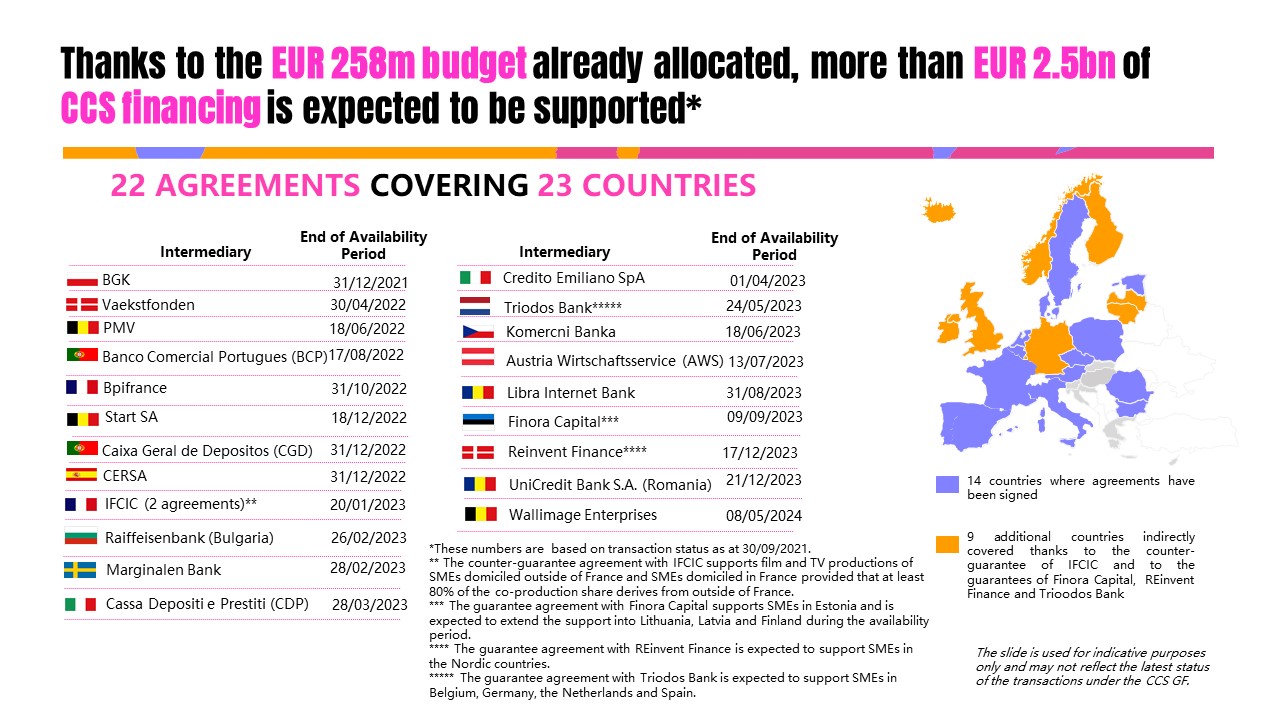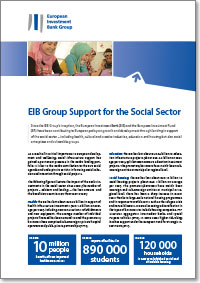- What we do
- Pan-European Guarantee Fund – EGF
- Institutional investors
- Equity products
- AI Co-Investment Facility
- Cleantech Co-Investment Facility
- Impact investing at the EIF
- Climate & Infrastructure Funds
- Technology Transfer
- European Angels Fund (EAF) - Co-investments with Business Angels
- Venture capital
- Lower mid-market
- Mezzanine Facility for Growth
- VentureEU
- EFSI Equity instrument
- Single EU Equity Financial Instrument
- Private equity secondary market transactions
- EIF-NPI Equity Platform
- ESCALAR Programme
- Debt products
- New ESIF ERDF Guarantee Fund initiative in Greece
- EFSI Private Credit Programme
- AGRI Guarantee Facility
- AGRI Italy Platform Uncapped Guarantee Instrument
- Credit enhancement
- Cultural and Creative Sectors Guarantee Facility (CCS GF)
- ENSI - Securitisation Initiative
- Erasmus+ Master Loan Guarantee Facility
- Skills & Education Guarantee Pilot
- EREM debt products
- Single EU Debt Financial Instrument
- Documentary Finance Facility – Bulgaria
- The SME Initiative
- Inclusive finance
- European Fund for Strategic Investments (EFSI)
- Regional Development - Country and sector-specific initiatives
- NPI SM-CDTI Innvierte Tech Transfer and Deep Tech
- ILTE: Co-investments into private credit funds
- RRF Spain - Alternative Lending for Sustainable Development
- EquiFund II
- Normandie Garantie Agri
- FAIRE - La Réunion
- Auvergne Rhône-Alpes FEADER
- Recovery Equity Fund of Funds of Bulgaria
- Fons d’Inversió en Tecnologia Avançada (FITA) Catalonia
- Dutch Future Fund (DFF)
- Dutch Alternative Credit Instrument (DACI)
- PORTUGAL BLUE: a new initiative for blue economy investments
- JEREMIE Greece Reflows – Business Angels’ Co-Investment Equity Instrument
- German Corona Matching Facility (CMF)
- Portugal Growth programme
- Central and Eastern European Technology Transfer (CEETT)
- Croatian Growth Investment Programme (CROGIP) II
- Croatian Growth Investment Programme (CROGIP)
- Croatian Venture Capital Initiative 2 (CVCi 2)
- AGRI Italy Platform Uncapped Guarantee Instrument
- DISPOSITIF INSTRUMENTS FINANCIERS BOURGOGNE FRANCHE-COMTÉ
- ALTER’NA – ESIF EARFD Nouvelle-Aquitaine
- Baltic Innovation Fund 1 (BIF 1)
- Baltic Innovation Fund 2 (BIF 2)
- Central Europe Fund of Funds (CEFoF)
- Croatian Venture Capital Initiative (CVCi FoF)
- Competitiveness Fund-of-Funds for SMEs in Romania
- Deep and Comprehensive Free Trade Area Initiative East Guarantee Facility (DCFTA)
- EU4Business Capped Guarantee
- Dutch Growth Co-Investment Programme
- Dutch Venture Initiative (DVI-II)
- ESIF Fund-of-Funds Greece
- EAFRD FoF Portugal
- EAFRD FoF Romania
- The ERP-EIF Facility
- ERP-EIF Co-Investment Growth Facility
- The LfA-EIF Facilities
- The German Future Fund (GFF) - EIF Growth Facility
- INAF – French National Agricultural Initiative
- ESIF Energy Efficiency and Renewable Energy Malta
- Regional Fund-of-Funds Romania
- ESIF Fund-of-Funds Czechia
- The Silesia EIF Fund of Funds
- La Financière Région Réunion
- The EIB Group Risk Enhancement Mandate (EREM)
- EstFund
- Call for Expression of Interest for FOSTER II
- Greater Anatolia Guarantee Facility (GAGF)
- G43 - Anatolian Venture Capital Fund Project
- InvestBG Equity Instrument
- JEREMIE
- Romania Recovery Equity Fund of Funds
- JEREMIE Romania Reflows – Equity Instrument
- Luxembourg Future Fund 1 (LFF)
- Luxembourg Future Fund 2
- Mezzanine 'Fund of Fund' for Germany (MDD)
- NEOTEC resources
- Polish Growth Fund of Funds (PGFF)
- Portugal Venture Capital Initiative (PVCi)
- Scottish-European Growth Co-Investment Programme
- SEGIP VC Fund - Call for expression of interest
- Swedish Venture Initiative (SVI)
- Turkish Growth and Innovation Fund (TGIF)
- Western Balkans Enterprise Development & Innovation Facility (WB EDIF)
- EAFRD FoF Greece
- Irish Innovation Seed Fund (IISF)
- RRF Czechia Fund of Funds
Cultural and Creative Sectors Guarantee Facility (CCS GF) – Information for businesses
Small and medium-sized enterprises (SMEs) or small public enterprises in the cultural and creative sectors, established and operating in any of the participating countries (currently EU Member States, Iceland and Norway) are eligible to benefit from EU-supported financing, provided that they are:
- involved in projects or activities based on cultural values and/or artistic and other creative expressions, either market or non-market-oriented, including the development, the creation, the production, the dissemination and the preservation of goods and services which embody cultural, artistic or other creative expressions, as well as related functions such as education or management. The cultural and creative sectors include architecture, archives, libraries and museums, artistic crafts, audiovisual (including film, television, video games and multimedia), tangible and intangible cultural heritage, design, festivals, music, literature, performing arts, publishing, radio and visual arts.
- not carrying out activities breaching ethical principles or focus on one or more EIF restricted sectors;
How can you benefit?
To apply for a loan, cultural and creative sector companies must contact the nearest financial intermediaries selected for each country. The facility has been rolled out in since 2016 and the network of financial intermediaries is expanding gradually according to the overview table below. For additional information about finance available under further EU initiatives, please visit http://europa.eu/youreurope/business/funding-grants/access-to-finance
Where is financing available?
If you are an SME in the cultural and creative sectors, looking for EU-supported financing in your country, please check the list of selected CCS GF intermediaries and the list of CCS GF sub-intermediaries. Further information on how to get financed under the CCS scheme is provided by these intermediaries directly.- EUR 25 million of loans for cultural and creative SMEs in the Czech Republic
- Over EUR 130 million of loans for cultural and creative SMEs in France and across Europe
- EUR 30 million of loans for cultural and creative SMEs in France
- First in Europe: EUR 150 million worth of loans for Spanish cultural and creative SMEs
CCS documents
Key information
Are you looking for a loan?
We use cookies to give the best browser experience on our website. or change cookie settings.
Copyright ©
European Investment Fund – The European Investment Fund is not responsible for the content of external internet sites.





